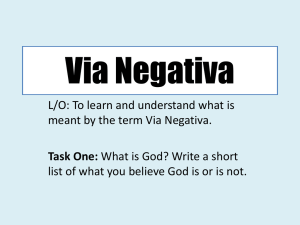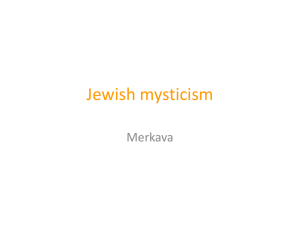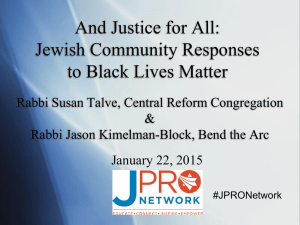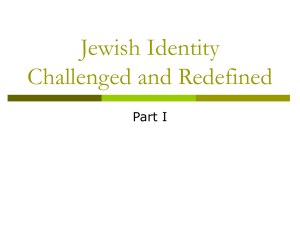Jewish Thinkers
advertisement
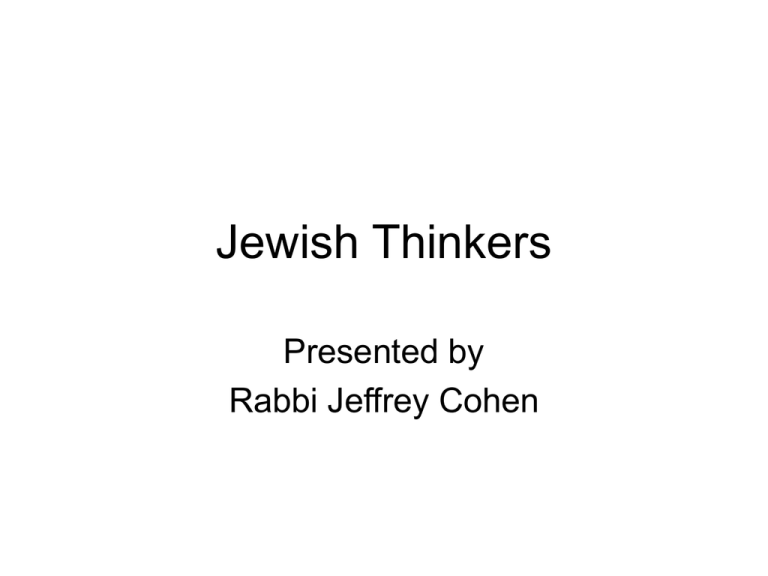
Jewish Thinkers Presented by Rabbi Jeffrey Cohen Significant People and Ideas • the contribution to Judaism of ONE significant person or school of thought, other than Abraham or Moses, drawn from: • Isaiah • Hillel (and Shamai) • Beruriah • Rabbi Solomon Isaac (Rashi) • Moses Maimonides • Kabbalah • The Hassidim • Moses Mendelssohn • Abraham Geiger • Rabbi Isaac Abraham Hacohen Kook (Rav Kook) • Jewish Feminism • another person or school of thought significant to Judaism Session 1 • • • • Moses Maimonides Moses Mendelssohn Abraham Geiger Rabbi Isaac Abraham Hacohen Kook (Rav Kook) Maimonides- the man • Rabbi Moshe ben Maimon was one of the towering figures in the history of the Jewish people. Of him it was said, "From Moshe (Moses) to Moshe (the son of Maimon) there arose none like Moshe." Among the Jewish people, he is known as the Rambam, an acronym for Rabbi Moshe ben (son of) Maimon (RaMBaM); while universally - for his fame and influence reached far beyond the confines of his own people - he is called Maimonides, the Greek form of "the son of Maimon." Maimonides- in his time Maimonideshis contribution • Maimonides composed both works of Jewish scholarship, and medical texts. Most of Maimonides' works were written in Arabic. However, the Mishneh Torah was written in Hebrew. His Jewish texts were: • The Commentary on the Mishna, in Hebrew Pirush Hamishnayot, written in Arabic. This text was one of the first commentaries of its kind; its introductory sections are widely-quoted.; • Sefer Hamitzvot ("The Book of Commandments"). • The Mishneh Torah (also known as " Sefer Yad ha-Chazaka"), a comprehensive code of Jewish law; • The Guide for the Perplexed, a philosophical work harmonizing and differentiating Aristotelian philosophy and Jewish theology; • Teshuvot, collected correspondence and responsa, including a number of public letters • Maimonides also wrote a number of medical texts; some of which are still in existence. The best known is his collection of medical aphorisms, titled Fusul Musa in Arabic ("Chapters of Moses", Pirkei Moshe in Hebrew). 13 principles of faith. • • • • • • • • • • • • • The existence of God God's unity God's spirituality and incorporeality God's eternity God alone should be the object of worship Revelation through God's prophets The preeminence of Moses among the prophets God's law given on Mount Sinai The immutability of the Torah as God's Law God's foreknowledge of human actions Reward of good and retribution of evil The coming of the Jewish Messiah The resurrection of the dead The Enlightenment • Emancipation, the process by which Jews gained the rights of citizenship, stimulated acculturation among the Jews. No longer required to exist solely within their religious community, Jews felt impelled to reorganize their sense of identity. Competing views regarding the format of the new, voluntary Jewish community led to the emergence of modern denominationalism. • The first denominational vision of modern Judaism to emerge was Reform, which developed first as a series of aesthetic changes, afterwards as a theological stance. Moses Mendelssohn • Moses Mendelssohn (September 6, 1729 – January 4, 1786) was a German Jewish philosopher. He was an important Jewish figure of the 18th century, and to him is attributable the renaissance of European Jews, Haskalah, the Jewish enlightenment. To some he was the third Moses (the other two being the Biblical lawgiver and Moses Maimonides) with whom a new era opens in the history of the Jewish people. To others, he was a step into the beginning of assimilation and loss of identity for Jews and the dilution of traditional Judaism. He was also the grandfather of the great composer Felix Mendelssohn. Moses Mendelssohn (cont) • He valued reason and felt that anyone could arrive logically at religious truths. • He argued that what makes Judaism unique is its divine revelation of a code of law. • He wrote many philosophical treatises and is considered the father of the Jewish Enlightenment. Abraham Geiger • Abraham Geiger (1810-74) German REFORM leader and scholar. After becoming a RABBI in Wiesbaden in 1832, he reformed the SYNAGOGUE service and published the Wissenschaftliche Zeitschrift fur judische Theologie. In 1837 he convened the first synod of Reform rabbis. Later he served as rabbi in Breslau, where he founded a school for religious studies and led a group that worked on HEBREW philology. He was a participant in subsequent Reform synods; from 1863 he served as rabbi in Frankfurt am Main. In 1870 he became rabbi of the Berlin congregation, and he helped establish the Hochschule fur Wissenschaft des Judentums in the city. Rav Kook • Abraham Isaac Kook (1865-1935), the first Ashkenazi chief rabbi of Israel during the British Mandate period, developed an alternative theological vision, sowing the seeds for religious Zionism. • Kook embraced the work of the secular Zionists because he thought the messianic era was at hand, and that the existence of secular Jewish power was a symptom of the upheaval predicted to precede the messianic age. • Born in Latvia, he retained throughout his life a unique blend of the mystical and the rational. • He saw the return to Eretz Yisrael as not merely a political phenomenon to save Jews from persecution, but an event of extraordinary historical and theological significance. • He sought to reach those who had strayed. He refused to reject Jews as long as they identified themselves as Jews. • Though keenly aware of the huge numbers of non-observant Jews, he had a vision of the repentance of the nation. His concept of repentance envisioned in addition to the repentance of the individual, a repentance of the nation as a whole; a repentance which would be joyous and healing. • He called for and envisioned a spiritual renaissance where "the ancient would be renewed and the new would be sanctified." • His vision of repentance disdained fear and apprehension and looked forward to "the poet of Teshuva [repentance], who would be the poet of life, the poet of renewal and the poet of the national soul waiting to be redeemed." Bibliography • • • • • • • • • • Maimonides (Jewish Encounters) by Sherwin B. Nuland Schocken, 2005 Maimonides Reader by Isadore Twersky Behrman House Publishing 1976 Ethical Writings of Maimonides Dover Publications; 1983 Maimonides: A Guide for Today's Perplexed by Kenneth Seeskin Behrman House 1991 Epistles of Maimonides: Crisis and Leadership by Moses Maimonides, Abraham Halkin, David Hartman Jewish Publication Society of America 1992 Maimonides: The Life and World of One of Civilization's Greatest Minds by Joel L. Kraemer Doubleday 2006 Maimonides: Metaphysics, Metaphor, Morality by Menachem Kellner Littman Library 2006 Dear Maimonides: A Discourse on Religion and Science Andrew Sanders Jason Aronson 1996 Maimonides' principles: The fundamentals of Jewish faith : an anthology by Aryeh Kaplan NCSY 1973 We Have Reason To Believe: Some Aspects of Jewish Theology Examined in the Light of Modern Thought Louis Jacobs Vallentine Mitchell; 5th edition, 2004 • • • • • • • Abraham Geiger and the Jewish Jesus (Chicago Studies in the History of Judaism) by Susannah Heschel University Of Chicago Press, 1998 Abraham Geiger and Liberal Judaism: The Challenge of the Nineteenth Century by Abraham Geiger, Max Wiener Hebrew Union College Press, 1981 The Art of T'Shuva: The Teachings of HaRav Avraham Yitzhak HaCohen Kook (Hardcover) by David Samson (Ed), Tzvi Fishman (Ed) Beit Orot Publications (1999) Guides for an Age of Confusion: Studies in the Thinking of Avraham Y. Kook and Mordecai M. Kaplan by Jack Cohen Fordham University Press, 2000 High Priest of Rebirth: The Life, Times and Thought of Abraham Isaac Kuk by Jacob Bernard Agus Bloch Pub Co; [2d ed.] 1999 Rabbi Abraham Isaac Kook and Jewish Spirituality (Reappraisals in Jewish Social and Intellectual History) by Lawrence J. Kaplan, David Shatz (Editor) New York University Press,1995 Abraham Isaac Kook: The Lights of Penitence, The Moral Principles, Lights of Holiness, Essays, Letters, and Poems by Ben Zion Bokser Paulist Press; 1978



